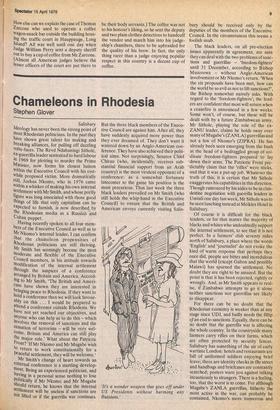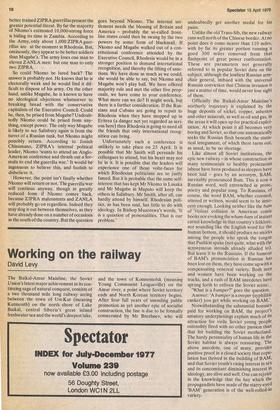Chameleons in Rhodesia
Stephen Glover
Salisbury Ideology has never been the strong point of Most Rhodesian politicians. In the past they have shown great talent for making and breaking alliances, for pulling off dazzling volte-faces. The Revd Ndabaningi Sithole, ex-guerrilla leader sentenced to hard labour m1969 for plotting to murder the Prime Minister, now forms his closest liaison Within the Executive Council with his erstwhile proposed victim. More dramatically Still, Joshua Nkomo, who in 1976 came Within a whisker of making his own internal settlement with Mr Smith, and whose portly figure was long associated with those good things of life that only capitalism can be expected to furnish, is now described by the Rhodesian media as a Russian and Cuban puppet.
Having recently spoken to all four members of the Executive Council as well as to Mr Nkomo's internal leader, I can confirm that the chameleon propensities of Rhodesian politicians are still thriving. Mr Smith has seemingly become the most moderate and flexible of the Executive Council members, in his attitude towards Modification of the internal settlement through the auspices of a conference arranged by Britain and America. According to Mr Smith, 'The British and Americans have shown they are interested in bringing —peace to Rhodesia. If they want to bold a conference then we will look favourably on this . . . I would be prepared to attend a conference outside Rhodesia. We have not yet reached our objectives, and anyone who can help us to do this – which Involves the removal of sanctions and the cessation of terrorism – will be very welcome. Britain and America can still play the major role.' What about the Patriotic Front? 'If Mr Nkomo and Mr Mugabe wish to return to work constitutionally for a Peaceful settlement, they will be welcome.' Mr Smith's change of heart towards an external conference is a startling development. Being an experienced politician, and having in a personal sense nothing to lose Politically if Mr Nkomo and Mr Mugabe should return, he knows that the internal Settlement will be useless if sanctions are not lifted or if the guerrilla war continues.
But the three black members of the Executive Council are against him. After all, they have suddenly acquired more power than they ever dreamed of. They don't want it watered down by an Anglo-American conference. They have also achieved their political aims. Not surprisingly, Senator Chief Chirau (who, incidentally, receives substantial financial support from an Arab country) is the most virulent opponent of a conference: as a somewhat fortunate latecomer to the game his position is the most precarious. Thus last week the three black leaders prevailed on Mr Smith (who still holds the whip-hand in the Executive Council) to ensure that the British and American envoys currently visiting Salis bury should be received only by the deputies of the members of the Executive Council. In the circumstances this seems a foolish snub.
The black leaders, on all pre-election issues apparently in agreement, are sure they can deal with the two problems of sanc tions and guerrillas – 'freedom-fighters' until 31 December, according to Bishop Muzorewa – without Anglo-American involvement or Mr Nkomo's return. 'When the six proposals have been met, how can the world be so evil as not to lift sanctions?', the Bishop somewhat naively asks. With regard to the 'freedom-fighters) the lead ers are confident that most will return when a ceasefire is announced in a few weeks.
Some won't, of course, but these will be dealt with by a future Zimbabwean army. Mr Sithole, playing the role of the exZANU leader, claims he holds sway over many of Mugabe's (ZANLA) guerrillas and not a few of Nkomo's (ZIPRA). He has already been seen emerging from the bush at the head of a bedraggled group of soidisant freedom-fighters prepared to lay down their arms. The Patriotic Front predictably claim that the 'rifles' were sticks, and that it was a put-up job. Whatever the truth of this, it is certain that Mr Sithole exaggerates his capabilities in this direction. Though rumoured by his aides to be in clandestine negotiation with guerrilla leaders in Umtali one day last week, Mr Sithole was to be seen lunching instead at Meikles Hotel in Salisbury.
Of course it is difficult for the black leaders, or for that matter the majority of blacks and whites who undoubtedly support the internal settlement, to see that it is not perfect. In a farmers' club seventy miles north of Salisbury, a place where the words 'English' and 'journalist' do not evoke the kind of warm response that perhaps they once did, people are bitter and incredulous that the world (except Gabon and possibly Malawi) has spurned the settlement. No doubt they are right to be amazed. But the point is that it has been rejected, rightly or wrongly. And, as Mr Smith appears to realise, if Zimbabwe attempts to go it alone neither sanctions nor guerrillas are likely to disappear.
For there can be no doubt that the Rhodesian economy is weaker than at any stage since UDI, and badly needs the fillip of an end to sanctions. Equally, there can be no doubt that the guerrilla war is affecting the whole country. In the countryside many farmers carry rifles on their farms, which are often protected by security fences. Salisbury has something of the air of early wartime London: hotels and restaurants are full of uniformed soldiers enjoying brief leave; there are identity checks in tile street and handbags and briefcases are constantly searched; posters warn you against talking incautiously to strangers. There is a feeling, too, that the worst is to come. For although Mugabe's ZANLA guerrillas, hitherto the most active in the war, can probably be contained, Nkomo's more numerous and better trained ZIPRA,guerrillas present the greater potential threat. By far the majority of Nkomo's estimated 10,000-strong force is biding its time in Zambia. According to the Army, ionly about 1,000 ZIPRA guerrillas are at the moment in Rhodesia. But, ominously, they appear to be better soldiers than Mugabe's. The army loses one man to eleven ZANLA men: but one man to only two ZIPRA.
So could Nkomo be lured back? The answer is probably not. He knows that he is electorally weak and he would find it difficult to dispose of his army. On the other hand, unlike Mugabe, he is known to have no ideological objections whatsoever to breaking bread with the conservative capitalists of the Executive Council. Could he, then, be prised from Mugabe? Undoubtedly Nkomo could be prised from anything, except power. The only way Mugabe is likely to see Salisbury again is from the turret of a Russian tank, but Nkomo might possibly return. According to Josiah Chinaman°, ZIPRA's internal political leader, Nkomo 'wants to attend an AngloAmerican conference and thrash out a formula to end the guerrilla war.' It would be ingenuous to believe this, and foolish to disbelieve it.
However, the point isn't finally whether Nkomo will return or not. The guerrilla war will continue anyway, though in greatly reduced form if Nkomo comes back, because ZIPRA malcontents and ZANLA will probably go on regardless. Indeed they may slog it out between themselves, as they have already done on a number of occasions in the south of the country. But the question goes beyond Nkomo. The internal settlement needs the blessing of Britain and America — probably the so-called frontline states could then be swung by the two powers by some form of blackmail. If Nkomo and Mugabe walked out of a constitutional conference attended by the Executive Council, Rhodesia would be in a stronger position to demand international recognition, and thereby the lifting of sanctions. We have done as much as we could, she would be able to say, but Nkomo and Mugabe won't play ball. We have offered majority rule and met the other five proposals, we have come to your conference. What more can we do? It might work, but there is a further consideration. If the Russians and Cubans are going to repair to Rhodesia when they have mopped up in Eritrea (a danger not yet regarded as serious here) then Rhodesia is going to need all the friends that only international recognition can bring.
Unfortunately such a conference is unlikely to take place on 25 April. It is possible that Mr Smith will persuade his colleagues to attend, but his heart may not be in it. It is possible that the leaders will experience one of those volte-faces for which Rhodesian politicians are 'so justly famed. But it is probable that the same selfinterest that has kept Mr Nkomo in Lusaka and Mr Mugabe in Maputo will keep the others in Salisbury. Mr Smith, after all, can hardly attend by himself. Rhodesian politics, as has been said, has little to do with ideology. In Bishop Muzorewa's words, 'It is a question of personalities. That is our problem.' undoubtedly get another medal for his pains.
Unlike the old Trans-Sib, the new railway runs well north of the Chinese border. At no point does it come nearer than 110 miles, with by far its greater portion running a good 300 miles removed from that flashpoint of great power confrontation. These are parameters not generally referred to in popular Soviet data on the subject, although the lowliest Russian armchair general, imbued with the universal Russian conviction that Chinese invasion is just a matter of time, would never lose sight of them.
Officially the Baikal-Amur Mainline's northerly trajectory is explained by the huge deposits of nickel, copper, asbestos and other minerals, as well as oil and gas, in the areas it will open up for practical exploitation. At which point it all becomes very boring and Soviet, so that one automatically seeks the Russian flesh beneath the statistical integument, of which there turns out, as usual, to be no shortage.
Like almost all Soviet institutions, the epic new railway — in whose construction as many testimonials to healthy proletarian labour have been produced as sleepers have been laid — goes by an acronym, BAM, inevitably pronounced Bum. This is now a Russian word, well entrenched in prose, poetry and popular song. To Russians, of course, the word BAM, whether crooned, uttered or written, would seem to be innocent enough. Looking neither like the barn of 'violent collision in American comic books nor evoking the wham-barn of instant carnal knowledge in that country's folklore, nor sounding like the English word for the human bottom, it should produce no smirks among the people who speak the tongue that Pushkin spake (not quite, what with the acronymous inroads already alluded to). But leave it to the Russians., If the humour of BAM's pronunciation in Russian has been lost on them, they have come up with a compensating venereal variety. Both men and women have been working on the tracks, and a rash of BAM anecdotes have sprung forth to enliven the Soviet scene:
'What is a bumper?' goes the question:
Answer: 'A bumper is a tree per (syphilitic canker) you get while working on BAM.'
Notwithstanding the substantial bonuses paid for working on BAM, the project's amatory underpinnings explain much of its attraction for virile Soviet young people ostensibly fired with no other passion than that for building the Soviet motherland. The hardy perenniality of human life in the Soviet habitat is always reassuring. The above anecdote, one of many, provides positive proof in a closed society that copulation has thrived in the building of BAM, and that Soviet youth's rising interest in sex and its concomitant diminishing interest. in ideology, are alive and well. One can rejoice in the knowledge that the hay which the propagandists have made of the starry-eyed `BAM' generation is of the well-rolled-in variety.



































 Previous page
Previous page